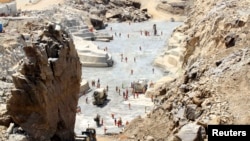Today, nearly a billion people in the developing world don't have access to clean, safe drinking water. In sub-Saharan Africa, people’s true potential is restricted by time lost trying to gather water and energy spent suffering from water-borne diseases. Education is lost to sickness. Economic development fails when people have to fight for survival.
As water supplies get tighter, conflicts will inevitably emerge, warns Lester Brown, the president of the Earth Policy Institute in Washington, D.C.
“Not only could it get worse, but it will get worse,” Brown said. “Africa has two water problems: water safety – getting water that is safe to drink- and getting enough water to produce food.”
Brown cited Egypt as one of the countries severely constricted by the loss of water as other Nile River countries upstream such as Ethiopia and Sudan take more of the Nile’s water. As a result, he said, Egypt is now importing over half of its wheat consumption.
Predictions of an economic crisis
Brown predicted an economic crisis as water losses make it more difficult for countries to grow enough grain which leads to the rise in internal food prices.
“This is one of the problems that Africa is going to be facing for a long time,” he said. “Egypt is probably the most vulnerable of all the countries in Africa because it is dependent on the River Nile water."
The Nile River basin is not well managed, he said. “I don’t think there has been a serious effort at improving the efficiency of irrigation water use, or efforts by governments’ to shift to less water intensive crops.”
Brown said a lot of rice is grown in Egypt and rice takes about twice as much water per ton of grain as wheat does. “But there is room for restructuring agriculture to substantially reduce water use,” he added.
Need for policies on population
Brown decried the lack of effort in coordinating water policy and population policy.
“There is no effort to coordinate population policies and water policies and yet in the end the amount of water available will determine the size of the population that can be supported."
The Nile is the world's longest river. It flows 6,700 kilometers through eleven countries in northeastern Africa. Egypt and Ethiopia are members of the Nile Basin Initiative, a partnership among those countries in Nile Riparian states. The initiative “seeks to develop the river in a cooperative manner, share substantial socioeconomic benefits, and promote regional peace and security.”
Another effort to reach agreement
On Wednesday, the water and irrigation ministers of Egypt, Ethiopia, and Sudan meeting in Khartoum reached an agreement to create a committee of experts to study the impact of the Ethiopia’s Grand Renaissance Dam. The committee will be supervised by an international consultancy firm.
The Sudan Tribune newspaper reports that the committee would bring four experts from each country together to produce a report by March 1, 2015. The newspaper reports that Egyptian Irrigation Minister Hussam El-Maghazi said the agreement is a mechanism for implementing the panel’s findings on Egypt’s share of the Nile and the structural integrity of Ethiopia’s dam design.
Egypt argues that Ethiopia’s multi-billion dollar hydro-electric dam project near the Sudanese border would eventually diminish Egypt’s share of the Nile’s water flow. It further asserts that the dam, which is the largest along the Nile River, would reduce the amount of electricity generated by the Aswan Dam and adversely impact its agricultural production.





